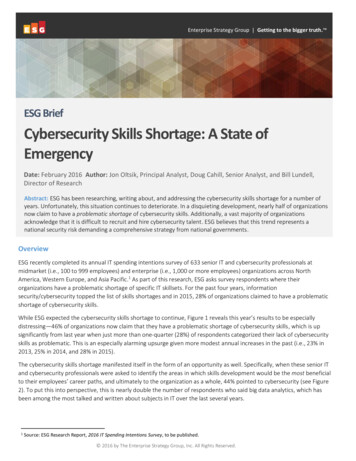
Transcription
Enterprise Strategy Group Getting to the bigger truth. ESG BriefCybersecurity Skills Shortage: A State ofEmergencyDate: February 2016 Author: Jon Oltsik, Principal Analyst, Doug Cahill, Senior Analyst, and Bill Lundell,Director of ResearchAbstract: ESG has been researching, writing about, and addressing the cybersecurity skills shortage for a number ofyears. Unfortunately, this situation continues to deteriorate. In a disquieting development, nearly half of organizationsnow claim to have a problematic shortage of cybersecurity skills. Additionally, a vast majority of organizationsacknowledge that it is difficult to recruit and hire cybersecurity talent. ESG believes that this trend represents anational security risk demanding a comprehensive strategy from national governments.OverviewESG recently completed its annual IT spending intentions survey of 633 senior IT and cybersecurity professionals atmidmarket (i.e., 100 to 999 employees) and enterprise (i.e., 1,000 or more employees) organizations across NorthAmerica, Western Europe, and Asia Pacific.1 As part of this research, ESG asks survey respondents where theirorganizations have a problematic shortage of specific IT skillsets. For the past four years, informationsecurity/cybersecurity topped the list of skills shortages and in 2015, 28% of organizations claimed to have a problematicshortage of cybersecurity skills.While ESG expected the cybersecurity skills shortage to continue, Figure 1 reveals this year’s results to be especiallydistressing—46% of organizations now claim that they have a problematic shortage of cybersecurity skills, which is upsignificantly from last year when just more than one-quarter (28%) of respondents categorized their lack of cybersecurityskills as problematic. This is an especially alarming upsurge given more modest annual increases in the past (i.e., 23% in2013, 25% in 2014, and 28% in 2015).The cybersecurity skills shortage manifested itself in the form of an opportunity as well. Specifically, when these senior ITand cybersecurity professionals were asked to identify the areas in which skills development would be the most beneficialto their employees’ career paths, and ultimately to the organization as a whole, 44% pointed to cybersecurity (see Figure2). To put this into perspective, this is nearly double the number of respondents who said big data analytics, which hasbeen among the most talked and written about subjects in IT over the last several years.1Source: ESG Research Report, 2016 IT Spending Intentions Survey, to be published. 2016 by The Enterprise Strategy Group, Inc. All Rights Reserved.
Brief: Cybersecurity Skills Shortage: A State of Emergency2FIGURE 1. Areas of IT Skills ShortageIn which of the following areas do you believe your IT organization currently has a problematicshortage of existing skills? (Percent of respondents, N 627, multiple responses accepted)CybersecurityMobile application developmentBusiness intelligence/data analyticsSocial media/marketing technologiesEnterprise mobility managementServer virtualization/private cloud infrastructureCompliance management, monitoring and reportingSocial enterprise/collaboration technologiesIT architecture/planningApplication developmentData protectionDatabase administrationHelp desk/service deskStorage administrationServer administrationNetwork administrationWe do not have any IT skills shortagesOtherDon’t 2%12%1%2%Source: Enterprise Strategy Group, 2016.FIGURE 2. Where IT Managers See Career Growth PotentialIn which of the following functional areas do you believe skills development would be mostbeneficial to your employees (i.e., IT staff) in terms of their career path and benefit to yourorganization? (Percent of respondents, N 627)Application developmentand deployment, 12%Cybersecurity (i.e.,information security),44%Infrastructuremanagement, 17%Big data analytics, 26%Source: Enterprise Strategy Group, 2016. 2016 by The Enterprise Strategy Group, Inc. All Rights Reserved.
Brief: Cybersecurity Skills Shortage: A State of Emergency3Cybersecurity Skills TrendsNearly half of all organizations surveyed claim to have a problematic shortage of cybersecurity skills, but are these skills inany particular area? To some extent. As the ESG data illustrates, one-third of organizations say that their biggestcybersecurity skills need is for cloud security specialists (see Figure 3). This shouldn’t be particularly surprising since manyorganizations are aggressively moving workloads to cloud-based environments and thus need to find employees who knowhow to protect and monitor this activity. Beyond cloud however, ESG is troubled by many of the other needs such asnetwork security specialists, security analysts, and data security specialists. These are standard cybersecurity skills by anymeasure, so this data indicates that many organizations remain understaffed and under-skilled in core cybersecuritydomains.FIGURE 3. Cybersecurity Areas with Biggest Skills DeficiencyWhich areas of cybersecurity would you say that your organization has the biggest skillsdeficiency? (Percent of respondents, N 299, three responses accepted)Cloud security specialists33%Network security specialists28%Security analytics27%Data security specialists26%Security engineering23%Security operations20%Identity and access management15%Application security specialists14%Endpoint security specialists14%We don’t have any cybersecurity skills deficiencies9%Source: Enterprise Strategy Group, 2016.ESG (and others) have been calling attention to the cybersecurity skills shortage for a number of years, but the datapresented in this brief indicates that the situation continues to degrade. This point is further evidenced by the fact that87% of survey respondents claim that it is very difficult, difficult, or somewhat difficult to recruit and hire cybersecurityprofessionals (see Figure 4). This is consistent with anecdotal stories in which CISOs claim that open requisitions go unfilledfor months at a time while cybersecurity staff complains of being constantly overwhelmed by the amount of work at hand,as well as ahead.How can CISOs stand out from the crowd and attract cybersecurity talent? Competitive salaries are table stakes when itcomes to being competitive in recruiting (see Figure 5). Beyond money, however, ESG data indicates that cybersecurityprofessionals are attracted to opportunities for personal growth such as the ability to work with leading securitytechnologies and processes, side benefits related to training and skills development, and the ability to work in anorganization and/or industry targeted by cyber-threats. Clearly, cybersecurity professionals want opportunities thatchallenge them, educate them, and support them. 2016 by The Enterprise Strategy Group, Inc. All Rights Reserved.
Brief: Cybersecurity Skills Shortage: A State of Emergency4FIGURE 4. Difficulty in Recruiting and Hiring Cybersecurity ProfessionalsIn your opinion, how difficult is it for your organization to recruit and hire cybersecurityprofessionals? (Percent of respondents, N 299)Very difficult, 13%Very easy, 3%Easy, 10%Difficult, 29%Somewhat difficult,44%Source: Enterprise Strategy Group, 2016FIGURE 5. Factors Most Important to Potential New Cybersecurity HiresWhen your organization does recruit and hire cybersecurity professionals, which of thefollowing factors do you believe are most attractive to potential candidates? (Percent ofrespondents, N 299, five responses accepted)Competitive salary52%The ability for new employees to work with leadingcybersecurity technologies and processes40%Side benefits related to training and skills development35%Cyber threats associated with your organization orindustryThe ability for new employees to work with seasonedcybersecurity professionals working at your organizationThe cybersecurity reputation of your organizationThe ability for new employees to participate incybersecurity eventsThe reputation of your CISO and/or other cybersecuritymanagement29%27%26%24%23%Source: Enterprise Strategy Group, 2016 2016 by The Enterprise Strategy Group, Inc. All Rights Reserved.
Brief: Cybersecurity Skills Shortage: A State of Emergency5Driven by continuing cybersecurity skills shortages, many organizations have no choice but to turn to managed andprofessional services organizations to supplement internal staff. As Figure 6 demonstrates, more than one-third (35%) oforganizations engage these firms in preparation for regulatory compliance audits, while 30% leverage these services tohelp with strategic cybersecurity planning and/or cybersecurity insurance underwriting, the latter of which is a relativelynew services need. Additionally, 23% of organizations will outsource some cybersecurity tasks to an MSSP. Given thepervasive cybersecurity skills shortage, this percentage will most likely grow in the future.FIGURE 6. Areas Organizations Will Engage a Third-party Services Firm for 2016 Cybersecurity Initiativesand ProjectsIn which of the following areas do you believe your organization will likely engage a thirdparty services firm for consultation on 2016 cybersecurity initiatives and projects?(Percent of respondents, N 299, multiple responses accepted)We will engage a third party to help us prepare for anaudit of our compliance with industry regulations,specifically the cybersecurity requirements35%We will engage a third party to help us with strategiccybersecurity planning with respect to internal policiesand procedures30%We will engage a third party to help us prepare for acybersecurity assessment as part of the underwritingprocess for a cybersecurity insurance policy30%We will engage a third party to help us assess the largenumber of vendors who offer security solutions23%We will outsource some of our security managementfunctions to a managed security services provider (MSSP)23%We will not engage a third-party services firm forconsultation on 2016 cybersecurity initiatives20%Source: Enterprise Strategy Group, 2016The Bigger TruthESG has been one of several organizations tracking the cybersecurity skills shortage and sounding the alarm for manyyears. While a few tactical programs have attempted to address this shortfall, ESG views them as lip service rather than areal solution. Alarmingly, the situation appears to be getting much worse—so much so that ESG now believes that thegrowing cybersecurity skills shortage represents a national security risk. Simply stated, demand for trained andexperienced cybersecurity professionals far exceeds supply. Lacking a comprehensive cybersecurity education and trainingstrategy, large organizations will continue to battle highly sophisticated and well-organized cyber-adversaries with theirown skeleton crew. 2016 by The Enterprise Strategy Group, Inc. All Rights Reserved.
Brief: Cybersecurity Skills Shortage: A State of Emergency6All trademark names are property of their respective companies. Information contained in this publication has been obtained by sources The Enterprise Strategy Group(ESG) considers to be reliable but is not warranted by ESG. This publication may contain opinions of ESG, which are subject to change. This publication is copyrighted byThe Enterprise Strategy Group, Inc. Any reproduction or redistribution of this publication, in whole or in part, whether in hard-copy format, electronically, or otherwise topersons not authorized to receive it, without the express consent of The Enterprise Strategy Group, Inc., is in violation of U.S. copyright law and will be subject to anaction for civil damages and, if applicable, criminal prosecution. Should you have any questions, please contact ESG Client Relations at 508.482.0188.Enterprise Strategy Group is an IT analyst, research, validation, and strategy firm that provides marketintelligence and actionable insight to the global IT community. 2016 by The Enterprise Strategy Group, Inc. All Rights Reserved.www.esg-global.com 2016 by The Enterprisecontact@esg-global.comStrategy Group, Inc. All Rights Reserved.P. 508.482.0188
security/cybersecurity topped the list of skills shortages and in 2015, 28% of organizations claimed to have a problematic shortage of cybersecurity skills. While ESG expected the cybersecurity skills shortage to continue, Figure 1 reveals this year's results to be especially










